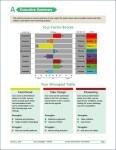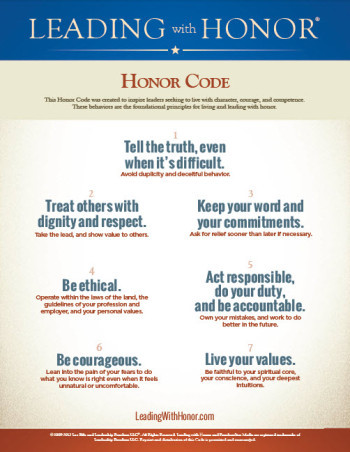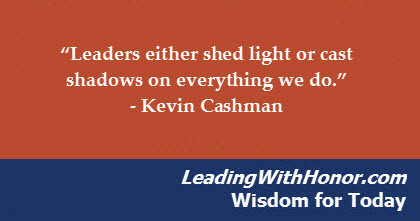Lee Ellis's Blog, page 266
August 10, 2016
Two Strategies to Avoid the Downward Trend in Honorable Leadership
 Do you watch trends? For some leaders, it’s easy to pick up on patterns and trends in business and culture. For other leaders, it’s not as intuitive. Lee shares his insight in this new article in The CEO Magazine. Please read below and share your comments – thank you
Do you watch trends? For some leaders, it’s easy to pick up on patterns and trends in business and culture. For other leaders, it’s not as intuitive. Lee shares his insight in this new article in The CEO Magazine. Please read below and share your comments – thank you


August 9, 2016
Michael Phelps – Olympic Leader? Share Your Comments
What are your comments about the journey of US Olympian, Michael Phelps? He’s returned again to compete in this Summer’s Olympic Games. He’s an undisputed leader in his sport. His latest interview is shown at the link below…
NBC Interview – Link


August 8, 2016
Gracious Endorsement from a Leading with Honor Reader
 Thank you, Jane D., for your kind words about Leading with Honor –
Thank you, Jane D., for your kind words about Leading with Honor –
“I absolutely love this book and the 14 leadership lessons taught. I had picked up the audiobook in a library and listened to it on repeat for weeks. Then I decided to buy the book and leadership guide. I led a group of 4 through the leadership lessons. This book has taught me so much from humility to accountability. Thank you Col. Ellis and I can’t wait for your next book, ‘Engage with Honor’.”
Preorder your copy of Engage with Honor and please share – thank you!


August 7, 2016
On This Day in Leadership History for August 7, 2016
On this day in leadership history in 1782, George Washington created the Order of the Purple Heart. The Continental Congress had forbidden General George Washington from granting commissions and promotions in rank to recognize merit. Yet Washington wanted to honor merit, particularly among the enlisted soldiers. Washington stated that the award was to be a permanent one, but once the Revolution ended, the Badge of Merit was all but forgotten until the 20th century. What’s the leadership lesson? Be gracious and look for ways to honor and recognize your team members. Every word or act is worth the effort.
Purple Heart – Link


August 6, 2016
Video Coaching Clip – “What’s the elusive missing link in getting leadership results?”
What’s the elusive missing link in getting leadership results in families, life, and work?? Recognizing the uniqueness of each person is critical. Lee Ellis shares his wisdom in the new, short coaching clip below – please watch and share your experience – thank you!
Want clips like this one in your inbox every month? Sign up for free Leading with Honor Coaching!


August 5, 2016
Leading with Honor Wisdom for Today, August 5, 2016
August 4, 2016
What Have We Become? (And What Are We Becoming?)
Every day, we change. We move (slowly) toward the person we’ll end up being. Not just us, but our organizations. Our political systems. Our culture. Are you more generous than the you of five or ten years ago? More confident as a leader? More willing to explore?
Here are some great reminders from author and speaker Seth Godin – Read this Article. Please share your comments too –


August 3, 2016
The Missing Link in Getting Leadership Results
What is it like when you work with a highly competent, skilled colleague that has little ability to connect with others? In my experience it’s frustrating and mentally draining! This soft skill of connecting with others is the art of leadership.
“To master this art, you have to learn to connect with each person based on his or her individual, unique design.” [Tweet This]
More specifically, it requires communicating and managing people differently based on their natural DNA behaviors, and it gets tangible results if you can master it.
Connecting is step two in the Courageous Accountability Model™ that I’m debuting in my upcoming September 2016 release*, Engage with Honor: Building a Culture of Courageous Accountability. Chapter Six is entitled “Connect: Know yourself and Know Your People.”
Connecting to Survive
Even in the stress and brutal moments of prison camps of Vietnam, our senior POW leaders were generally wise about connecting. It was obvious that we were all very similar as aircrew who had similar interests, training, and values about our work. But what impressed me was the way they understood that we were actually a very diverse group of people who needed to be managed differently. Looking back, I can see that, like any group, we were very different in many ways. For example –
Some were extroverts and some were highly reserved.
Some were very commanding and some were more compliant.
Some were highly organized and some were very spontaneous.
As a group of military warriors we leaned toward the courageous side of the bell curve, yet there were still significant differences among us in our ability to withstand torture. In that crucible, you couldn’t hide, and had to face the enemy head-on, all alone during torture sessions. Almost everyone did their best, yet individually our resistance could vary significantly. And though there were many examples of incredible bravery, there were no John Wayne characters among us. They could break anyone and with rare exceptions, they would not let you die. So whether it was a Vietnam prison guard or a fellow comrade in the camps, connecting with each person was a unique experience.
Strengths and Struggles with Our Opposites
Let me give you a couple of examples from everyday life that will be more familiar to you. I’m very candid and direct—sometimes bordering on blunt. That’s my natural style, and it worked well as a young fighter pilot. My bosses and teammates were generally very similar. But among the general population at least one-third are the exact opposite and very turned off by this directness. In those cases it’s counterproductive to my leadership. That type of connection and communication style actually drives their performance down.
Operations vs Sales Example
Another example would be organization and planning. People in operations roles are typically good planners and thrive in working out the details. Oppositely, sales people are generalists and getting them to be specific and finish their reports on time is often a challenge.
Connecting with Team Members
Managing with consideration for individual differences is more like art than science and many people aren’t naturally talented with the intuition and insight required. To make this art more scientific for individual and team development, we’ve developed an online assessment, Leadership Behavior DNA™**, that presents human behavior based on statistical data. This information enables leaders to quickly understand themselves and also see how others are similar and different. With these insights, it’s much easier to know who to confront directly and who needs a kinder, gentler approach.
I made several mistakes in my early years as a leader by assigning the wrong people to tasks—expecting them to be successful just because they had been excellent performers in another area. I learned the hard way that people are not stamped out on an assembly line. Individual differences matter.
Trying to Change Your Spouse Doesn’t Work
I’ve always been very honest in my blogs—maybe too transparent at times to make a point. I’ll go out on the edge one more time. I actually tried to change my wife to be more like me for the first years of our marriage. Then when I began developing assessments twenty-six years ago, I saw our scores. We were two to three standard deviations apart on almost every factor of personality. We have totally different talents. What she does well, I’m not good at and vice versa. She intuitively knew it, but I had never accepted it. The assessment made the art more scientific. I could see it in the graphs and there was no denying that we’re very different. It was a revolutionary revelation that also changed my understanding of leadership and management. If you’ve experienced the same dynamic early in life with a spouse, sibling, parent, or child, you understand the importance of this revelation.
Embracing and Managing Differences
“The truth is that people are born with a wide array of talents—we’re not the same.”[Tweet This]
The most effective leaders—the ones who connect, motivate, and inspire their people to higher performance—are those who have mastered the art of connecting individually to build relationships and manage differences.
What about you? Do you start from a worldview that every individual is unique? And if so, do you make the effort to connect with them in the way that works best for them. In our training, we call it the Platinum Rule for relationships—“Do unto others as they would like to be done unto.” It’s a powerful concept and the gold standard of how to take the Golden Rule one step further in your leadership.
>>>Watch Lee’s Leading with Honor Coaching Clip on this topic – Sign Up Free for Instant Access<<<
LE

The latest book from Lee Ellis, Engage with Honor, is being released on September 7, 2016! Learn how to build a culture of courageous accountability with you and your team, and improve your bottom line performance. Learn More and Pre-order your copies.

Based on more than 30 years of research and experience in developing leaders, Leadership Behavior DNA™, led by leadership consultant, coach, and trainer Lee Ellis, focuses on some of the key behavioral issues of leadership, helping managers understand their unique strengths and struggles. With this awareness, they can adapt their leadership style to help each person reach their full potential. Learn More and Download a sample report.


August 2, 2016
Wishing All Teachers a Great School Year – Complimentary Offer Inside
 This week, Leading with Honor wishes all teachers and school staff a great school year – thank you for leading the next generation of leaders!
This week, Leading with Honor wishes all teachers and school staff a great school year – thank you for leading the next generation of leaders!
If your classroom needs a honor code, please download a complimentary copy created by Lee Ellis and Leading with Honor.


August 1, 2016
Preorder Available Now for Engage with Honor – See Inside
 Preorders are already accumulating for Lee’s new book, Engage with Honor. Order your advance copy now, and it’ll ship on the day of release! Visit your favorite retailer below, and please share – thank you!
Preorders are already accumulating for Lee’s new book, Engage with Honor. Order your advance copy now, and it’ll ship on the day of release! Visit your favorite retailer below, and please share – thank you!
Amazon – Link
Barnes and Noble – Link
Walmart – Link
Books a Million – Link
iBook – Link
AAFES Exchange – Link














